Marketing automation users experience a 451% increase in qualified leads.
That can result in almost 4 times more business. And who doesn’t want that?
All you need to do is create the workflows I will tell you about in your HubSpot CRM.
Ready?
Let’s start with the HubSpot marketing automation workflows you need for your eCommerce store.
If you want to skip the basics of eCommerce marketing automation and go directly to the workflows list, click here.
What Are Marketing Automation Workflows?
“A marketing automation workflow or simply workflow is a chain of set tasks triggered automatically based on the conditions you set.”
Simply put, in the workflows, you can specify conditions and the actions that’ll be executed automatically if the condition is met.

Let’s say you want to welcome new users with a Welcome Email containing a discount coupon code for their first order. You can create a workflow that’ll deliver such email automatically whenever a new user is enrolled in your contact list.
Once you do this, you’ll notice the impacts of unifying HubSpot workflows with coupons. Works every time!
What are marketing automation workflows in HubSpot?
Marketing Automation Workflows in HubSpot are a set of automated actions that are triggered by a specific event or behavior, designed to nurture leads and guide them through the marketing funnel.
These workflows are created in HubSpot’s Marketing Hub and allow you to build targeted and personalized communications for your leads and customers. The workflows are designed to be dynamic. That means the actions taken can vary based on the behavior of the lead.
Email automation workflows
A series of automated emails triggered by specific actions taken by a user or subscriber, such as signing up for a newsletter, making a purchase, or abandoning a cart.
These workflows are pre-designed emails sent out automatically to targeted individuals or segments of your audience at specific times based on a predetermined set of conditions and triggers.
Email automation workflows aim to nurture your leads and customers with relevant and personalized content that helps move them through the sales funnel, increases engagement, and ultimately boosts conversions.
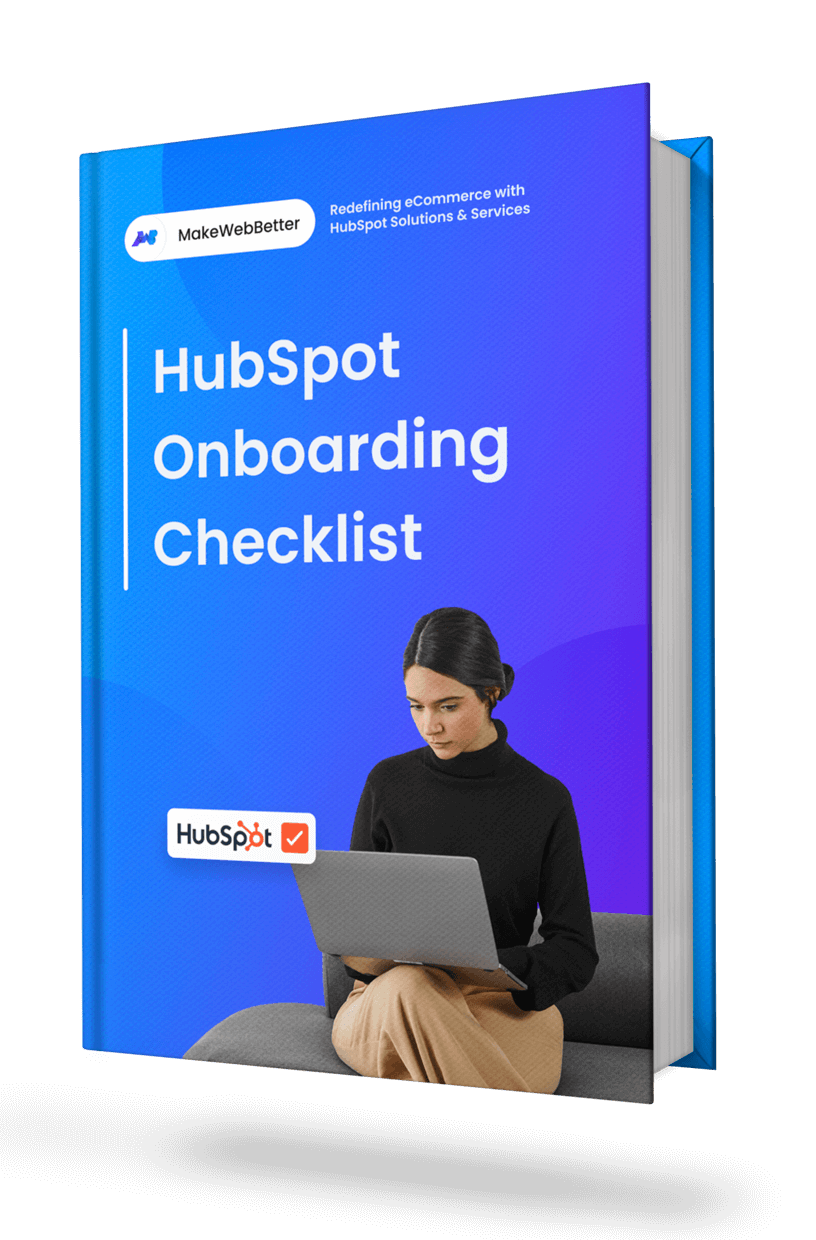
Declutter Your Data With FREE HubSpot Cleanup Guide!
Organize & optimize your inaccurate & duplicate data & see better resulting CRM performance!
Types of Workflows in HubSpot
HubSpot allows you to create 8 different types of workflows.
- Contact-based Workflows
- Company-based Workflows
- Deal-based Workflows
- Ticket-based Workflows
- Quote-based Workflows
- Conversation-based Workflows
- Feedback Submission-based Workflows
- Goal-based Workflows
As the names suggest, these workflows are triggered based on their respective objects.
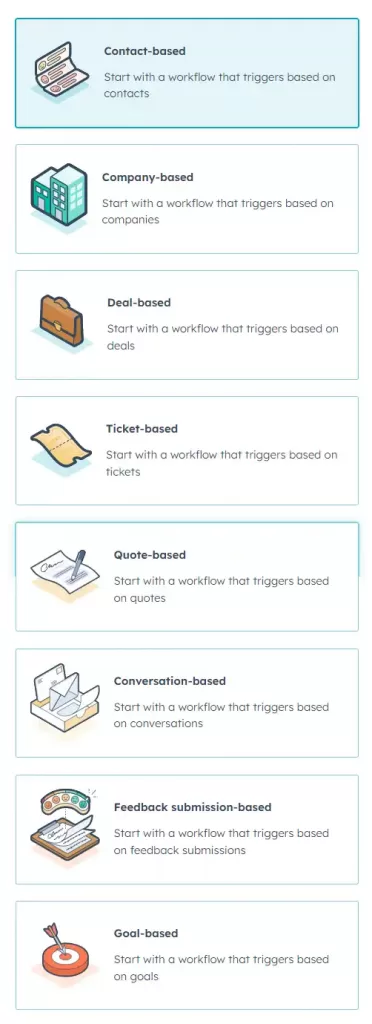
Now let’s move to the crux of the blog and talk about the best HubSpot Marketing Automation workflows you need to create for your eCommerce business.
10 HubSpot Marketing Automation Workflows for eCommerce Business
There are basically 10 types of HubSpot marketing workflows that you’ll find useful as an eCommerce store.
Let’s say you want to welcome new users with a Welcome Email containing a discount coupon code for their first order. You can create a workflow that’ll deliver such email automatically whenever a new user is enrolled in your contact list.
1. Welcome Email Workflow
Give your visitors a warm welcome by planning a series of welcome emails.
Welcome emails have an open rate of 50%. That’s 86% better than standard newsletters.
Remember, the goal of your welcome email should be to greet the user first. Moving them forward to purchase something comes later.
So craft a simple and appealing welcome email. Here’s an example:
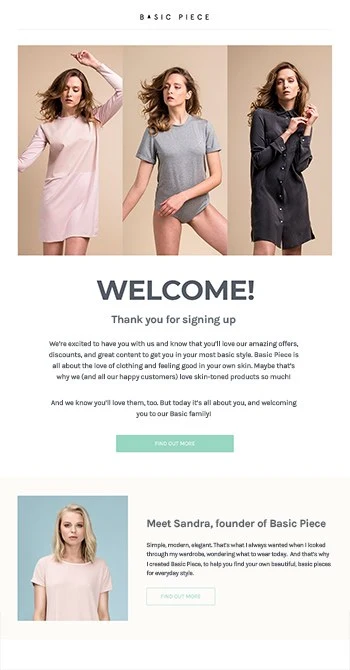
It can contain a concise welcome message with the CTA(s) as you need. If the user engages with your welcome email, you can send the next mail that shares some articles and valuable content with the audience to onboard them.
The third mail can explain your products or services.
Your actual Welcome email workflow could look like this:
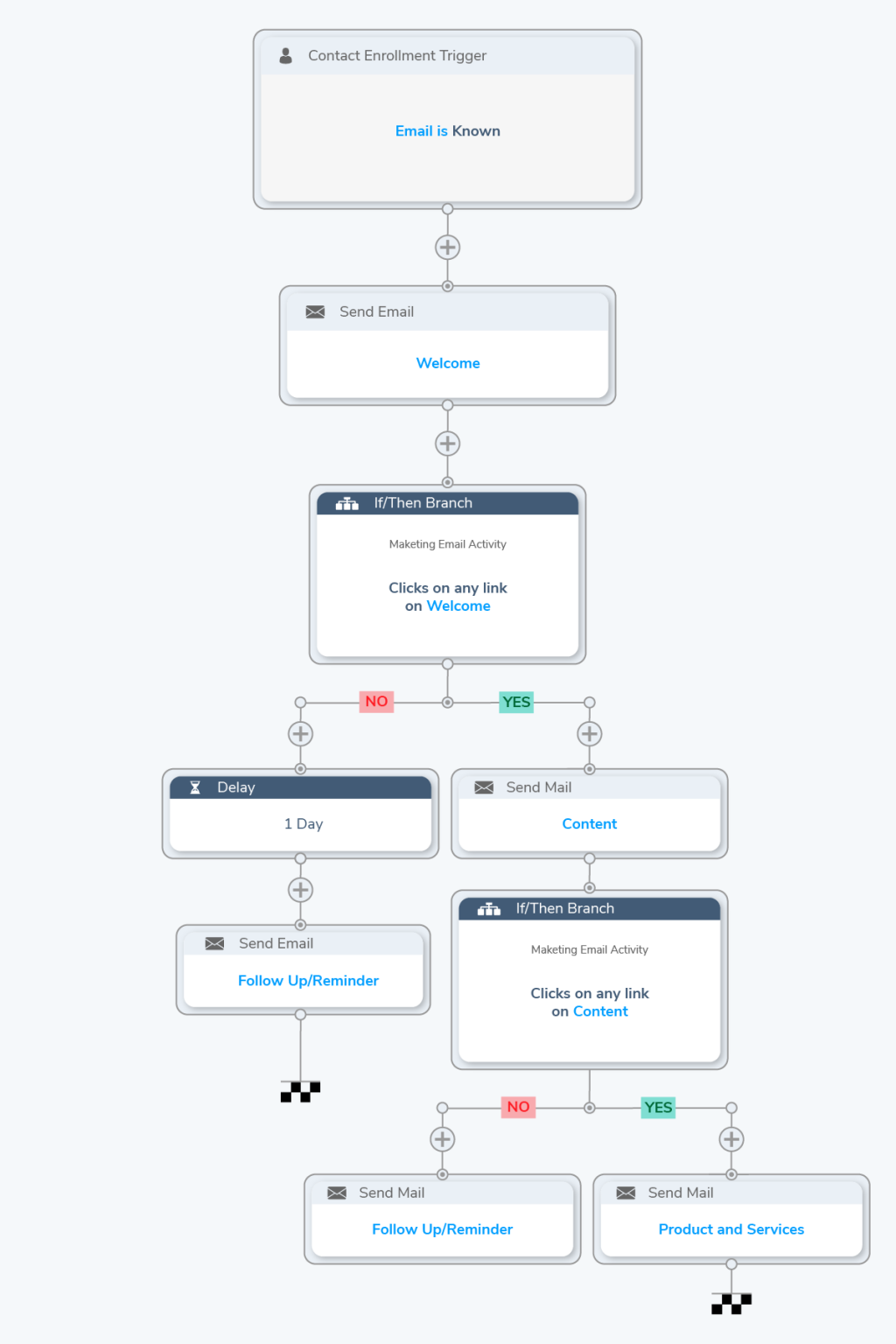
I’m curious to know what your welcome email workflow looks like. Let me know in the comments section. Let’s move forward and see other HubSpot marketing automation workflows.
2. Lead Assigning Workflow
Lead handoff or lead rotation is a fundamental HubSpot eCommerce workflow.
You can initially assign a contact/lead to a respective team member so they can nurture it further through this workflow.
For example, if any user submits an enquiry form on your website, it’ll be added as a contact in your CRM. You can then set conditions to assign that user to a specific rep in your organization to help him.
Here’s how this lead assigning workflow may look like:
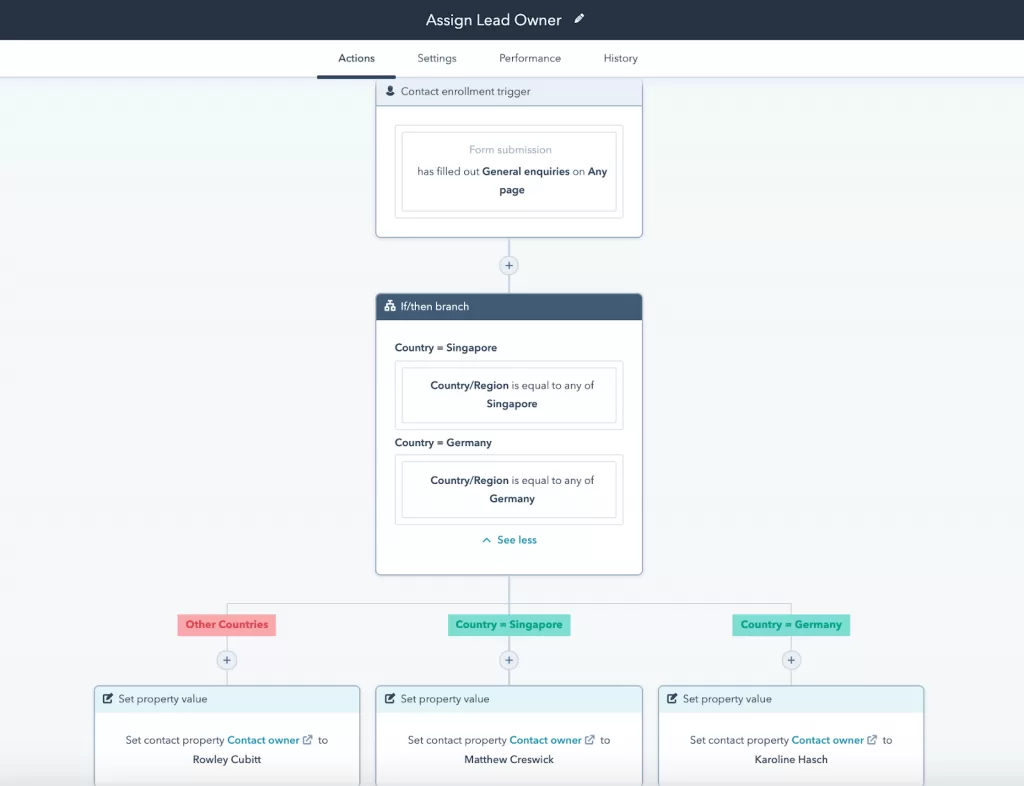
This HubSpot marketing automation workflow would ensure no contact will leave your website with their queries unanswered.
3. Hot Lead Workflow
Hot leads are the low-hanging fruits for your business.
A hot lead has more chances of converting, and targeting them with the right message can turn them into customers. To do so, you’ll need to set up a HubSpot workflow that alerts your sales team when a contact has reached the “hot lead” status.
For this, you can use some of these properties, like the number of downloads, Email Open Rates, CTRs (Click-Through Rates), etc. This will help you identify how much contact is engaged on your website.
If the contact is engaged enough on your website, you can set the workflow to trigger and deliver her the best offers.
If the contact engages with your offerings, you can change their lifecycle stage and pass it to your sales reps, who will handle them and instigate them to purchase.
Here’s an example of a hot lead nurturing workflow:
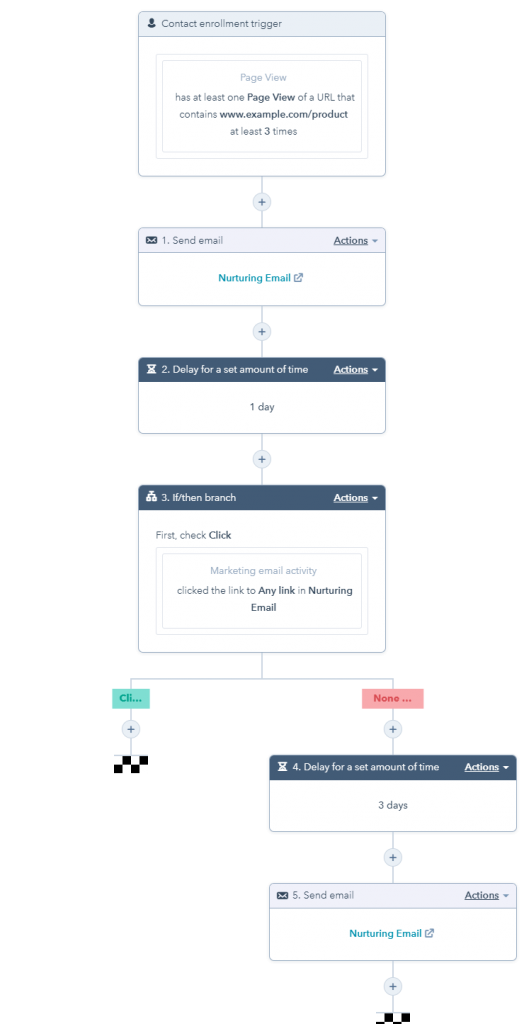
4. First Order Discount Workflow
Every eCommerce brand does this today.
When new users sign up for their platform, they offer a discount coupon for their first purchase.
This is quite an effective way to push users towards buying something without actually pushing them.
Reports say customers who use coupon codes spend 24% more than those who don’t.
You can create a discount coupon and send it through the Welcome email. If you don’t want to put the coupon in the welcome email, you can send it after someone interacts with your welcome mail.
Here’s what this workflow may look like:
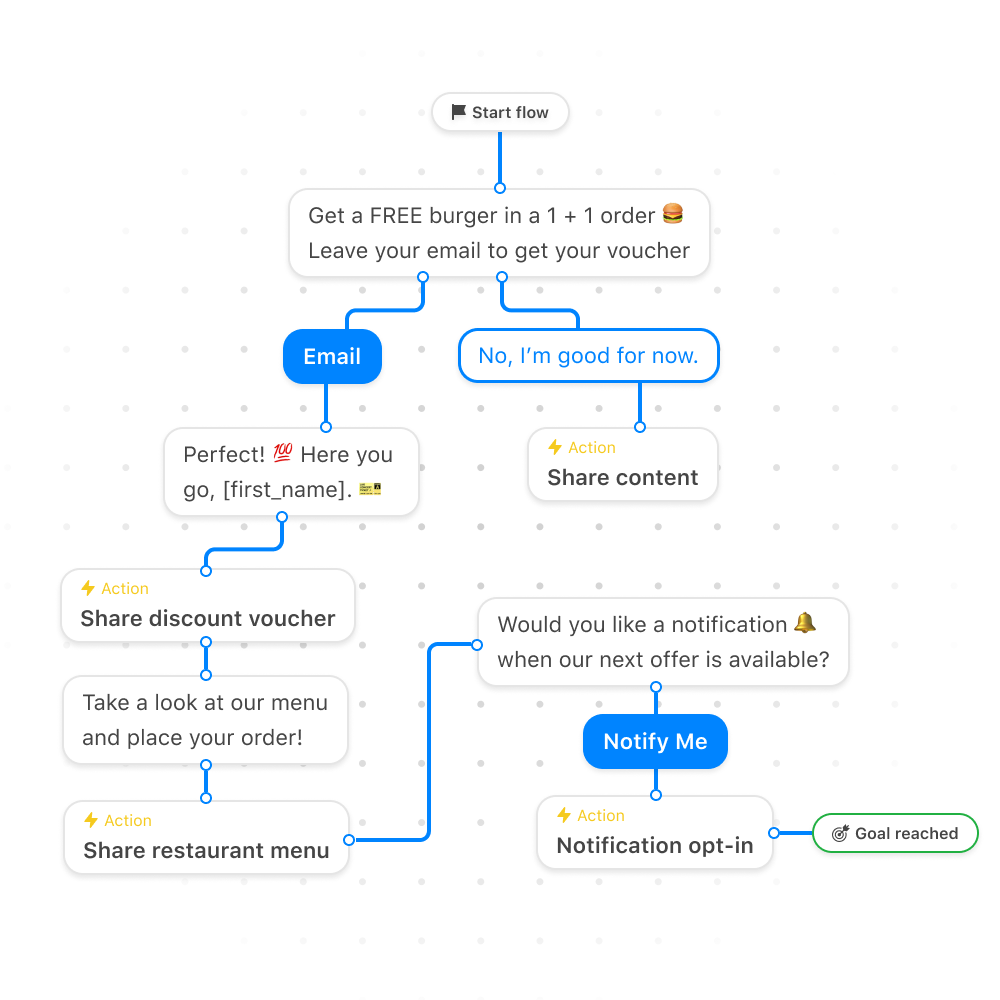
Discounts on the first order will most likely persuade users to purchase something. I’m saying this from my experience since I always try to claim the first order discount.
So make sure you offer a discount on the first purchase since that’s trending and a great way to move your customers further on their buyer’s journey.
Let’s look ahead and see some other HubSpot eCommerce workflow you must create for your business.
5. Customer Re-engagement Workflow
If your leads are not interacting with you in the long run, don’t lose hope.
It may be because they forgot you or are waiting for your good deals. It’s your responsibility to wake them up or offer something they can’t resist.
You can create a re-engagement workflow by determining factors that can be why they left you. Trigger this HubSpot workflow when a specified amount of time passes since they have performed the last activity (Like email open, form submission, or visits).
No doubt HubSpot helps you close more deals. What you can do is first you need to identify your inactive leads, then go for update your email preferences and offer freebies and coupons based on their past downloads and website activities. But with a DEADLINE (Like — Yes, please keep me subscribed).
Here’s an example of a customer re-engagement workflow:
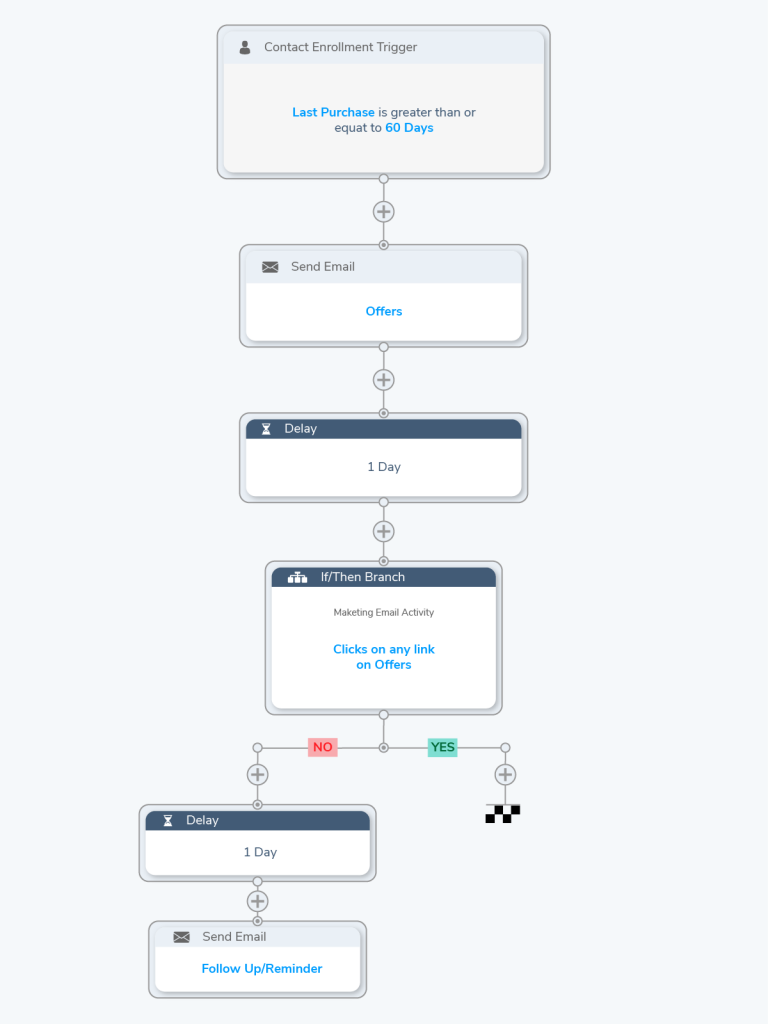
6. Abandoned Cart Recovery Workflow
Every year, eCommerce brands face $18 Billion loss because of abandoned carts. That’s way too much money.
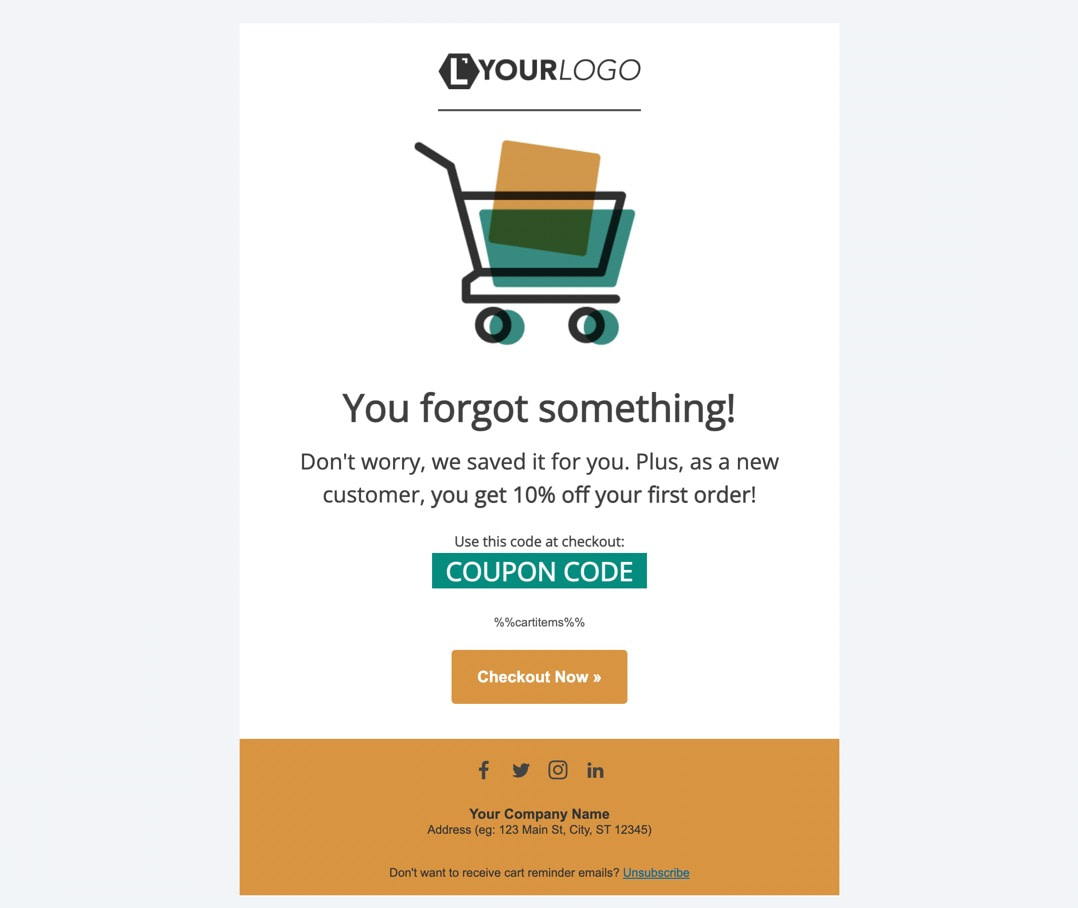
At least you can recover some of the money for your business through this workflow.
When someone adds some item to their online shopping cart and leaves it without completing the purchase, you can trigger this HubSpot marketing automation workflow.
In this workflow, you can automatically send users the link to their abandoned cart with the products they added. If they click on the link, they’ll be redirected to their cart, making it easy to complete the purchase.
Here’s an example of the abandoned cart workflow:
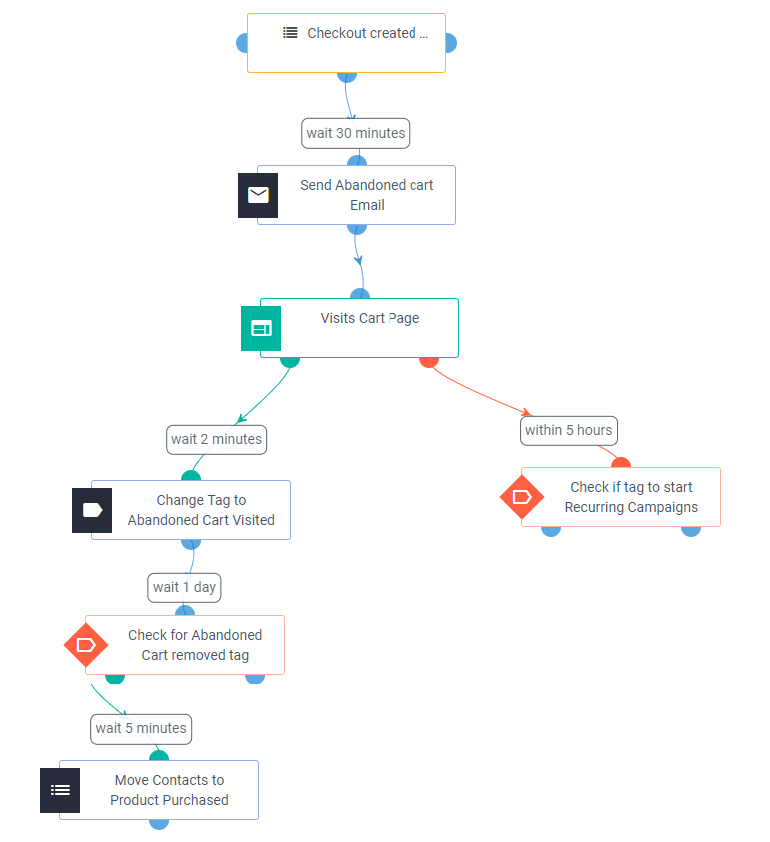
This HubSpot eCommerce workflow sends a series of emails to remind your users that they’ve forgotten something in their cart. And pitch them with a relevant discount on the item they left in their cart.
A Klaviyo report found that the open rate, click rate, and revenue per recipient for the abandoned cart recovery emails are 41.18%, 9.50%, and $5.81, respectively.
So don’t let your cart abandoners go just like that. Follow them with your best offers to recover a good amount of money.
7. Post-purchase Feedback Workflow

Addressing your customer’s concerns after they make a purchase from you gives them a positive feeling of being in safer hands.
They might have faced discrepancies in the checkout process or difficulty during the shipping. It can be anything.
This HubSpot Marketing Automation Workflow improves the overall customer experience.
Bill Gates says, “Your most unhappy customers are your greatest source of learning”.
Your unhappy customers will share the cons of your business process, and satisfied customers will give you positive reviews, testimonials, and case studies.
Even if your customers love your brand, you can use this workflow to collect positive reviews you can flex later. Here is an example of a simple workflow asking for feedback.
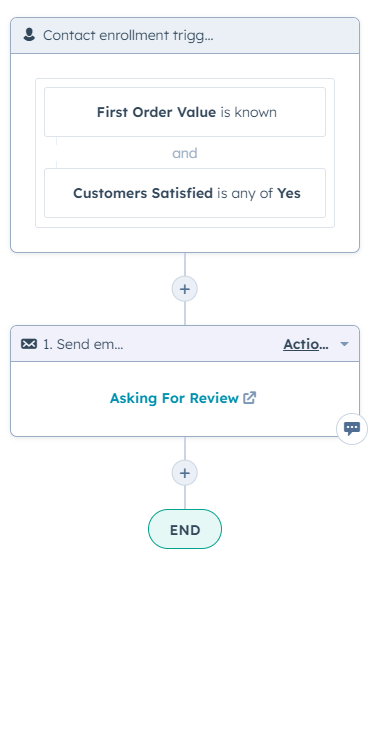
8. Upselling Workflow
Upselling is a marketing technique that encourages customers to buy a better version of the product and service without a push.
If you are new to this concept, check the best upselling strategies to get a hold of the topic.

It’s 50% easier to convert an existing customer than to search for a new one. So, why not invest your time smartly and upsell your products and services via this eCommerce marketing automation workflow?
Don’t stop communicating with them, even if you have sold them once. Give product recommendations, create product bundles, Display Related Products Smartly, and track the KPIs.
Here’s an example of the upselling workflow you can use for your online business:
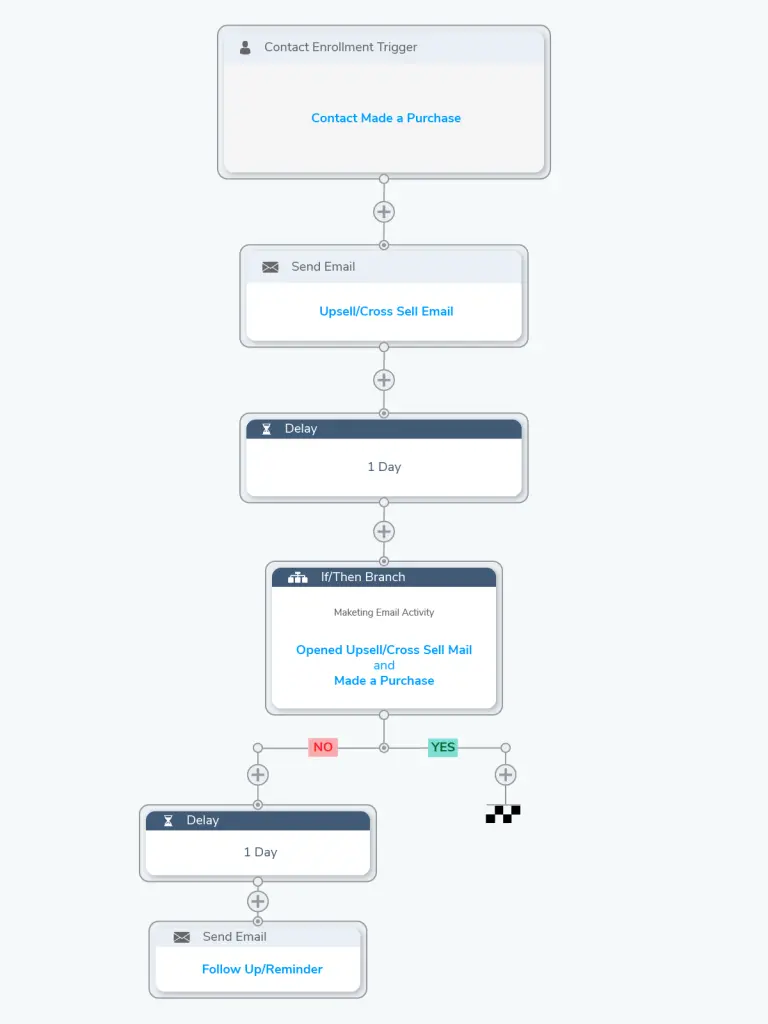
This HubSpot eCommerce workflow has great potential to multiply your revenue. So make sure to create this in your HubSpot CRM
9. Customer Happiness Workflow
This HubSpot Marketing Automation Workflow will help you determine your customer’s willingness to recommend your products and services to others.
It is like you determine overall customer satisfaction with your product and services. This Marketing workflow not only helps you figure out your “happy” customers. But also helps you filter “unhappy” customers and how you can improve their overall customer experience.
The science behind this workflow is the Net Promoter Score surveys. This NPS surveys your customer base by dividing your customer base into 2 parts, i.e., happy customers and unhappy customers.
To determine the ideal customer score, you must prepare a smart list of happy customers by setting a threshold.
Trigger two different HubSpot workflows for your happy and unhappy customers. With a filtered list of customers, trigger a HubSpot workflow for your happy customers and give them exclusive offers, rewards, and content.
While another one is for your “unhappy” customers that hold content/offers focused on enhancing the overall customer experience.
Address the reasons that make your customers feel unhappy. List them up, and gradually empty the list by converting all your unhappier to happier ones.

10. Miscellaneous HubSpot Marketing Workflows for eCommerce
We have covered most of the important workflows in HubSpot marketing automation software. Still, as a HubSpot-hosted eCommerce store, you’ll encounter some important events you can take care of with HubSpot marketing workflows:
a. Birthday or Anniversary Workflow
A birthday or anniversary workflow helps you show that you care about your customers as individuals and just treat them as buyers. It leads to increased engagement, improved customer experience, and builds a positive brand image. After celebrating one year of working with you, recognize them with a thank you email.
You can now focus on other aspects of your business and build customer relationships together.

To create a birthday workflow, you can set up a contact property to track the customer’s birth date. You can create a custom date property in HubSpot for this purpose. Creating custom property in HubSpot lets you add details necessary for your business.
Here’s what an anniversary workflow would look like.
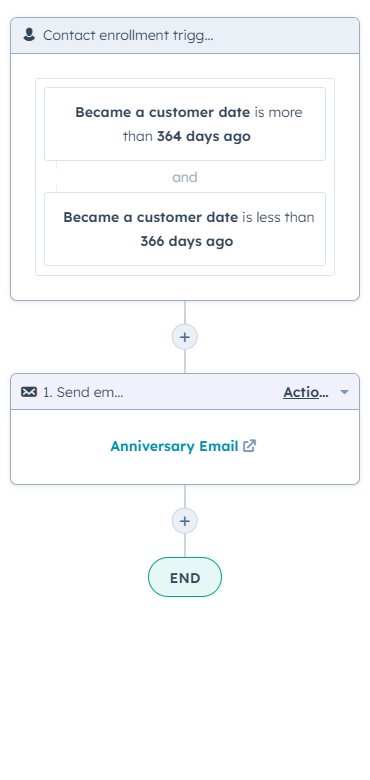
Don’t forget to include a personalized message, exclusive offers, or a discount code for the special occasion.
I think it’s the perfect time to acquaint you with HubSpot Loyalty Reward Points. If you’re sending out birthday and anniversary emails, this will definitely work in your favor.
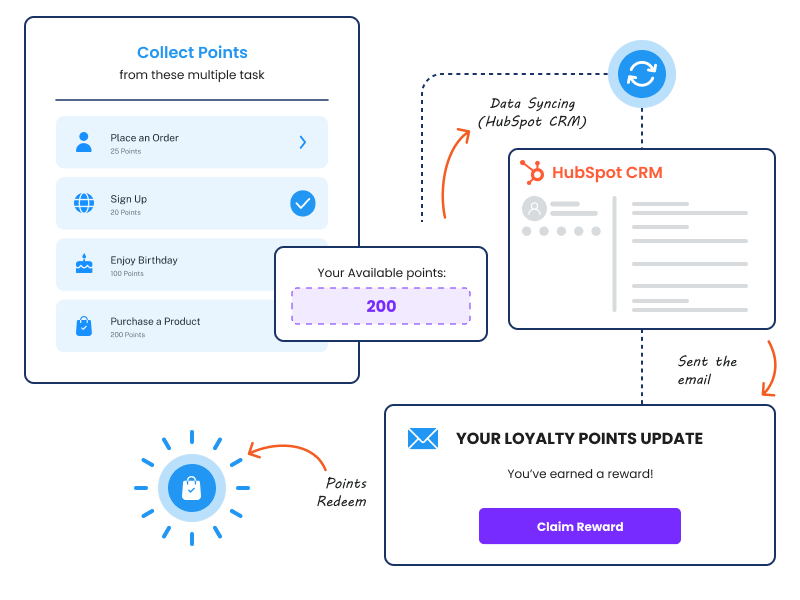
With Loyalty Reward Points, you can build stronger relationships with your customers while promoting sustainable, long-term growth for your business. With every point, they’re likely to come back.
Check Loyalty Reward Points documentation for more details about its working.
b. Event Invitation Workflows
This HubSpot workflow targets customers who have expressed interest in attending events or webinars hosted by your eCommerce business.
When a contact registers for an event, earn trust and build excitement with a confirmation email.
eCommerce businesses certainly hold webinars or other events. They’re a great way to showcase your products and services and build brand awareness.

The emails in the workflow could include event details, registration links, and reminders.
The event workflow shall trigger when someone fills out a form on your website for an event. Subsequently, a confirmation email will be sent to the customer.
You’ll need to create a form for your event registration and the email you want to send the users.
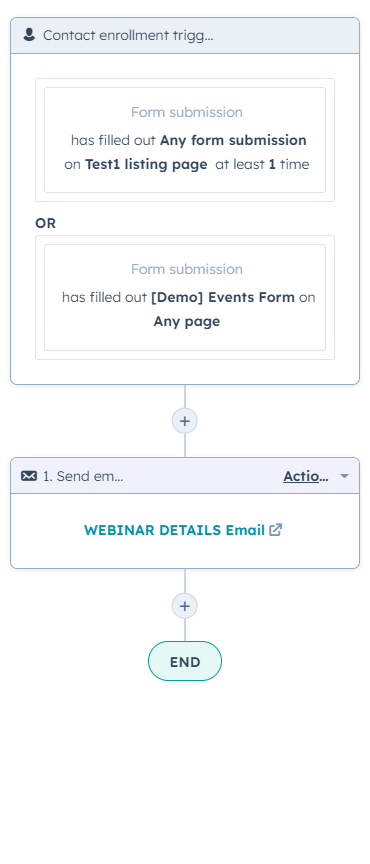
For example, an eCommerce business that sells pet products could hold a virtual event on pet care tips or how to choose the right pet food. Similarly, an eCommerce business that sells fashion accessories could host a virtual styling session or fashion show.
Once the event is over, you can use the contact information you collected to follow up with attendees and continue to nurture them with relevant content and offers.
This can help to build long-term relationships with your customers and prospects and drive sales for your eCommerce business.
c. Replenishment Workflow (for Subscription Business)
This workflow targets customers who have purchased products that need replenishment regularly, such as consumables or personal care products.
The emails can be triggered based on the purchase frequency and include reminders and incentives to encourage customers to reorder.
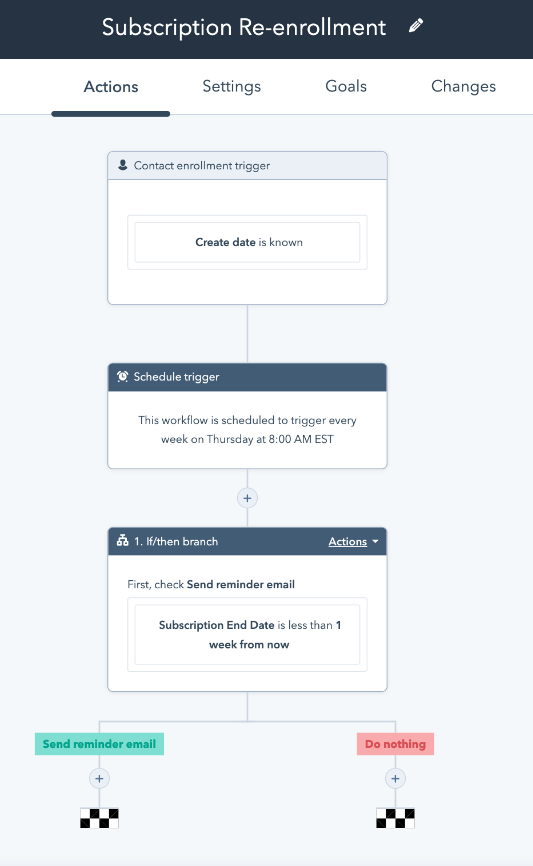
Using these HubSpot workflows, you can automatically send emails to subscribers at the end of a weekly or monthly subscription. These emails are reminders based on subscription end dates.
I’d like to give you an example of Nonprofits acting as subscription businesses while accepting donations.
They offer a recurring giving program that allows making regular and ongoing donations, mostly on a monthly or annual basis.
Nonprofits can use subscription-based automation workflows very smartly and efficiently. By offering exclusive benefits and content, nonprofits can create a sense of community and loyalty among their supporters while also generating a reliable source of revenue to support their mission.
While we’re at it, I’d like to introduce you to FormPay, a HubSpot payment integration app that eases your donation collection. It allows converting your native HubSpot forms into nonprofit donation-accepting forms.
You can easily integrate payment gateways like Amazon Pay, Adyen, Paypal, Stripe, Razor Pay, etc. all you have to do is
- signup > add HubSpot portal > setup gateways > create, configure & publish form(s)
Read FormPay HubSpot Integration Documentation for more details.
How to Create HubSpot Workflows?
Creating workflows in HubSpot is quite easy.
Note: You’ll need any Professional or Enterprise HubSpot plan to create workflows.
To make one, you need to follow these steps:
- Go to your HubSpot CRM portal.
- Navigate to Automation > Workflows from the menu bar.
- Click on the Create Workflow button.
- Either start from scratch or select a template to create your workflow.
- Click Next to start creating your workflow.
- Add the enrollment trigger to the workflow that’ll trigger the workflow.
- Then add conditions and statements according to your needs.
Once your HubSpot workflow is created, you can test, review and publish your workflow.
Benefits of Using HubSpot Marketing Automation Workflows
1. Saves Your Time
Doesn’t matter how big or small your business is. You have to do a handful of tasks.
But everyone has only 24 hours in a day. And if you’re also falling short on time, these workflows can greatly help.
You can automate repetitive tasks through these HubSpot marketing workflows, like sending emails, assigning tasks to your reps, nurturing leads, and more.
2. Make Each User Feel Special
You can use HubSpot tokens and properties to create personalized emails you’ll send through these emails.
By sending personalized emails to all your users, you’ll enhance their customer experience and make them feel special and that you care for them.
3. Reduce Customer Churn
91% of the customers leave your brand without complaining.
So if you don’t want your customers to leave your brand, you’ll have to improve their customer experience.
You can do this by personalizing the emails you send through these workflows. This will enhance the user experience, making users stick to your brand.
4. Better Customer Nurturing
These workflows will help you deliver content for each stage of the buyer’s journey.
You can deliver content for the awareness, consideration, and decision-making stages. When you do this, you nurture your users better. And nurturing your customers ensures your customers will move into the next stage with no friction.
5. Automate Email Marketing
Smart marketers use the top marketing automation tools. And HubSpot gives you all the more reason to find that out.
Workflows can be the core of your emai333l marketing automation. They’ll let you carry out all recurring important actions without getting tired and set the tone for the right person at the right time.
Automated emails can be personalized depending on their interest and choices. And since these emails are only triggered after a specific user action, you don’t have to worry about sending email to the wrong person.
Best Practices for Using HubSpot Marketing Automation Workflows for eCommerce Businesses
1. Segment Your Business Audience
Marketing automation allows you to deliver targeted messages to specific audience segments. So make sure to take advantage by segmenting your audience based on particular factors that are important for your business.
2. Personalize Your Messaging in HubSpot Workflows
Use dynamic content and personalized messaging to make your workflows feel more relevant and engaging for your leads and customers. Remember, personalization is key to successful marketing automation workflows.
3. Test and Iterate
Marketing automation workflows should be viewed as a work in progress. Continuously test and iterate your HubSpot workflows to improve their effectiveness and ensure you deliver the right message to the right people at the right time.
Make sure to test your workflows before publishing them. This lets you know if they’re working as intended with optimized performance for delivering the best results.
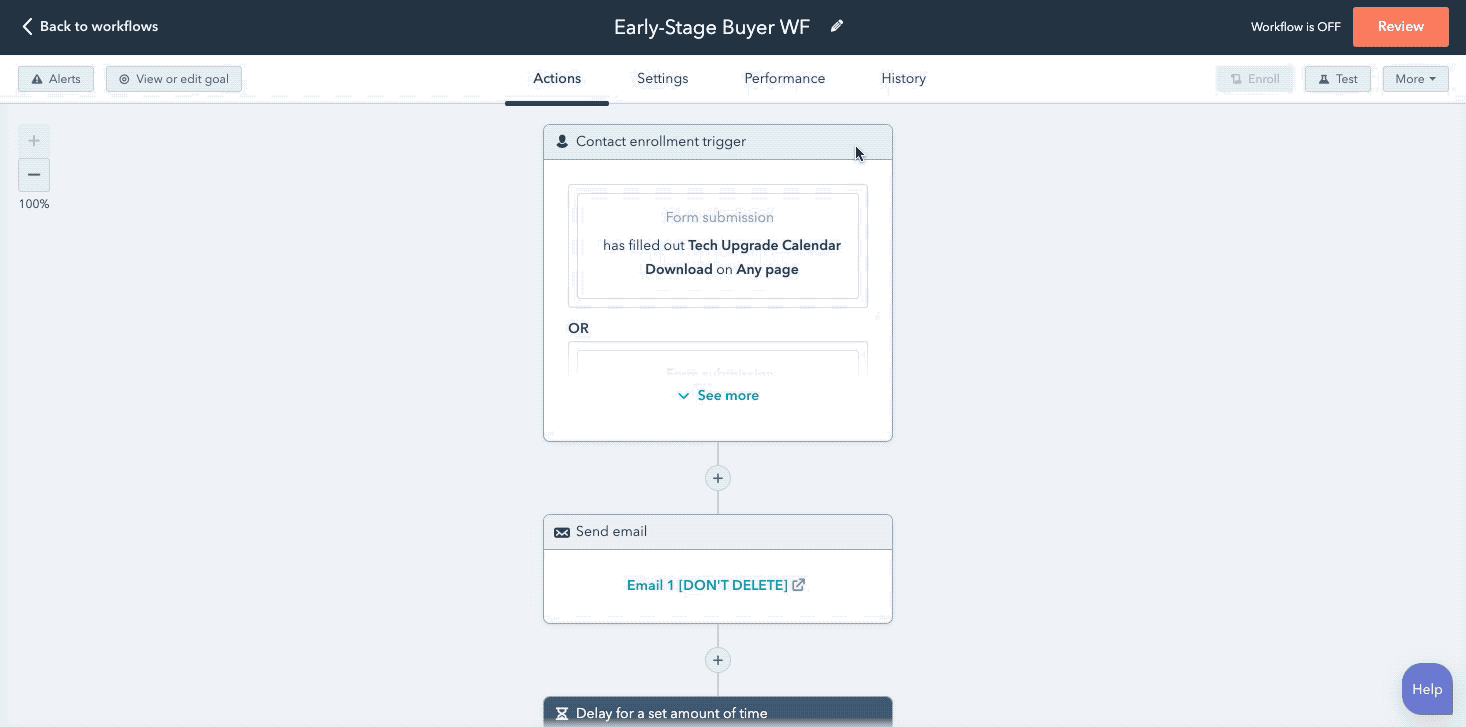
Read here for steps to test your HubSpot workflows.
4. Use Triggers and Timing Wisely
Triggers and timing are critical to marketing automation workflows. Ensure you set up triggers and timing that make sense for your audience and your business goals.
Trigger actions like form submissions, email opens & clicks, and contact properties are better than website visits.
5. Monitor Your Results
Regularly monitor the results of your marketing automation workflows to ensure they achieve your desired outcomes. Use data to inform your decisions and make adjustments as needed.
You can check the performance of your HubSpot workflow:
- Select any published workflow > details > performance
6. Integrate Your Workflows with Other Marketing Channels
HubSpot’s marketing automation workflows can be integrated with other marketing channels, such as social media and paid advertising.
Consider integrating your workflows with other channels to create a seamless and cohesive customer experience.
There is a whole list of HubSpot integrations that can help you do so much more than you might imagine.
You can also maximize the effectiveness of your HubSpot marketing automation workflows and drive more eCommerce sales and revenue.
Over To You
If I need to tell you why you should create these workflows, I’d say eCommerce marketing automation is the best gift you can give your business. Marketing automation tools make the life of your marketing and sales team better!
You can deliver a more personalized experience to your audience with these HubSpot Marketing Automation Workflows.
You may not get results overnight. But eventually, these best HubSpot eCommerce workflows will surely work for you.
If you’re still unsure how to create and set up these HubSpot marketing automation workflows in your CRM, just connect with our HubSpot experts, who will help you.
And if you have invested in HubSpot or looking to do that and are not sure about setting up or configuring it as per your business, you can consider our HubSpot Onboarding services. Additionally, consider knowing everything about HubSpot Onboarding.
We’ll be configuring it and making it ready to use as per your business.
Need An Expert Hand to Set Up These HubSpot Workflows?
Share your requirements, and we’ll set up these workflows on your HubSpot CRM.

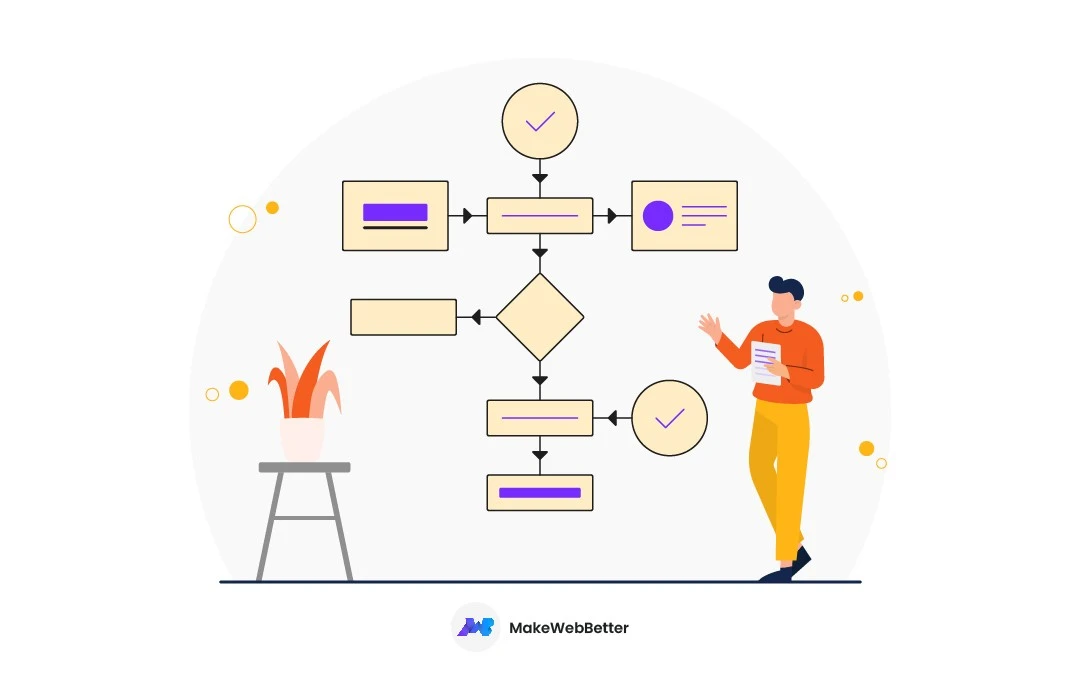
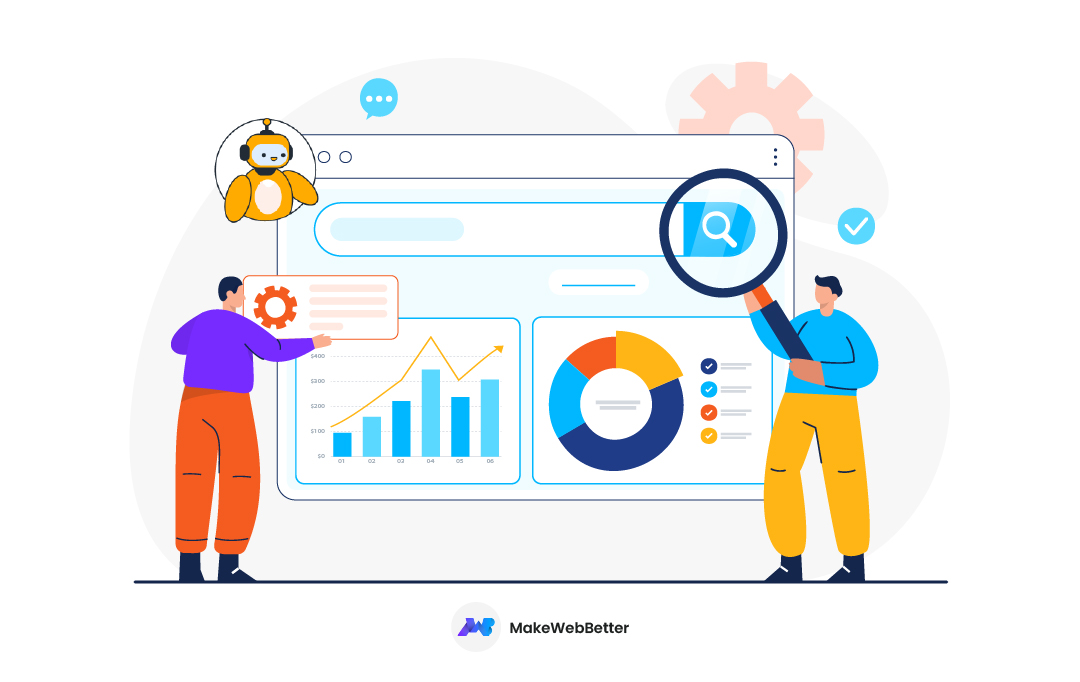
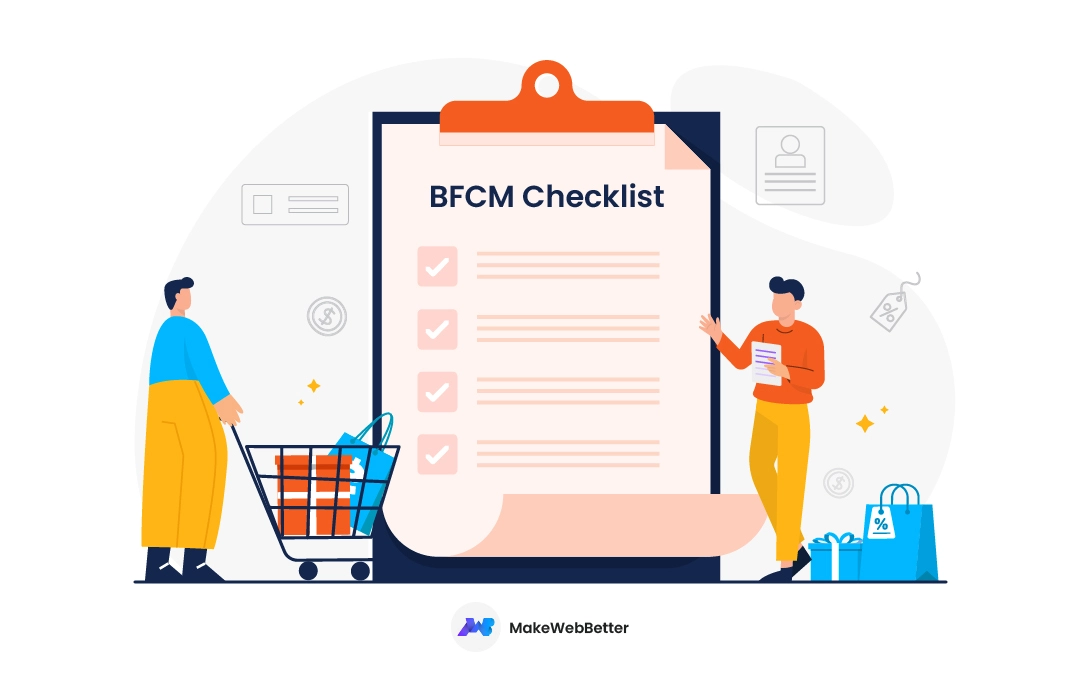

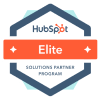
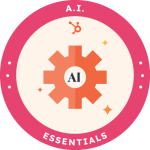




Amazing content!
Loved your article!
I hope it helped you and gave what you were looking for. Thanks for reading :)